US Envoy To UN Slams Iran's Leadership Roles In Human Rights Bodies
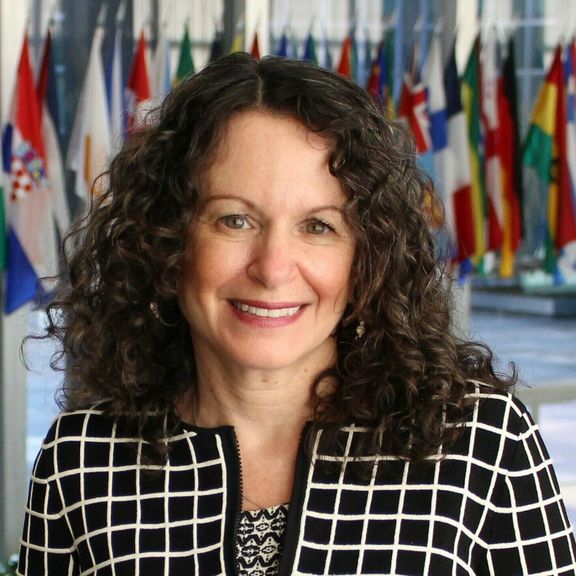
US Ambassador to the UN's Human Rights Council has condemned Iranian officials in UN leadership roles on the anniversary of Mahsa Amini's death.

US Ambassador to the UN's Human Rights Council has condemned Iranian officials in UN leadership roles on the anniversary of Mahsa Amini's death.
Michèle Taylor's comments come as the Islamic Republic of Iran prepares to chair the UN Human Rights Council Social Forum in November.
Taylor stated, "As we approach the one-year anniversary of Mahsa Amini's tragic death, let me be clear: The US reasserts that Iran, with its appalling human rights record, has no place in leadership roles in the UN human rights ecosystem. The time for accountability is now."
Mahsa Amini, a 22-year-old Iranian woman received fatal wounds after the hijab police arrested her in Tehran and died three days later in the hospital. Her death led to months of antiregime protests during which security forces killed more than 500 civilians and arrested around 22,000.
The controversy surrounding Iran's involvement in UN leadership positions has been a contentious issue. In June, the Islamic Republic secured a leadership role as one of the vice-presidents of the UN General Assembly, drawing reactions from several member states and numerous activists.
In May, Iran's UN ambassador, Ali Bahraini, was appointed to chair the UN Human Rights Council 2023 Social Forum, leading to widespread anger and indignation. The forum is scheduled to take place in Geneva on November 2 and 3.
In response to these appointments, UN Watch, an independent human rights organization, launched a petition to UN Secretary-General Antonio Guterres, urging him to cancel the appointments. Additionally, UN Watch submitted a resolution to the UN to overturn the decision, gaining further attention and scrutiny regarding Iran's involvement in UN leadership positions.

Iran's leading Sunni cleric has criticized the regime for persecuting the religious minority, stating that the President failed to fulfill his campaign promises.
During his Friday prayer sermon, Mowlavi Abdolhamid criticized the regime for following a set of 'unwritten policies' that discriminate against the Sunni population in political and social spheres.
Sunnis make up at least 10 percent of Iran's 88 million population, and Zahedan, where thousands attend Abdolhamid’s Friday prayers every week, is one of the few Sunni-majority cities in a predominantly Shiite country.
He asserted that the authorities of the Islamic Republic intend to entrust the management of Sunni religious schools to Shia Muslims, a policy that has led to the imprisonment of several Sunni individuals who resisted this decision. Mowlavi Fat’hi-Mohammad Naghshbandi, the Friday prayer leader of the city of Rask, was arrested in August, sparking several days of demonstrations and a heavy security presence by regime agents in Sistan-Baluchestan province.
"The government can oversee religious school operations, but management should remain in the hands of Sunnis," he insisted. In areas where the government has imposed its favored Friday Prayer leaders, "the people no longer attend those mosques because they consider them state-owned."
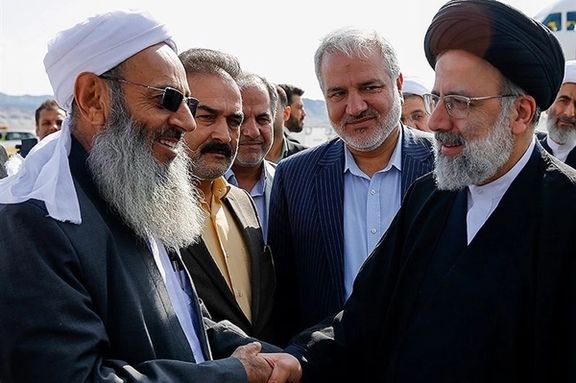
“Sunnis have been demanding justice and equality for the past 44 years, yet their demands have gone unmet,” Abdolhamid emphasized, noting that "during the Pahlavi era, Sunnis held senior positions in the army and the police, and the region was under the control of its people.”
“However, during the Islamic Republic, there hasn't been a single Sunni minister in the government,” he lamented, adding that Sunnis are excluded from managerial positions even in Sistan-Baluchestan province. “Meritocracy is absent in the Iranian government,” he asserted.
Criticizing inequalities in regions with substantial Sunni populations, he insisted, "In the appointment of managers in provinces such as Kordestan and Sistan-Baluchestan, there should be a balance between Sunnis and Shiites."
Abdolhamid also criticized the regime for turning every problem into a security issue, urging the authorities to allow minorities to practice their religion without fear of persecution. “Don't close Sunni mosques. Do not close places of worship for Jews, Christians, and other non-Islamic religions."
He also mentioned his meetings with President Ebrahim Raisi, stating that "Among the issues I raised were establishing relations with neighboring and Islamic countries, resolving livelihood and economic problems, and addressing the concerns of Sunnis and Iranian ethnic minorities."
Iran’s top Sunni leader added that the current administration has failed to fulfill any of its promises to the Sunnis made during the election campaigns, such as appointing Sunnis as governors, deputy ministers, or envoys to other countries. "You have approximately 180 ambassadors. If you let ten of them be Sunnis, nothing would happen. Sunnis are also an integral part of this land and your fellow citizens."
"Our most crucial demand is that the government does not differentiate between Shiites and Sunnis," he emphasized, stressing that the rights of all Iranian ethnic and religious minorities should be respected.
While Abdolhamid was delivering his sermon, the regime had shut down the internet in Zahedan and several other cities in the province, disrupting the live streaming of his speech on social media platforms.
After the Friday prayers, the people of Zahedan took to the streets in protest, chanting slogans demanding the release of detained Sunni Friday Prayer Leader Mowlavi Fat’hi-Mohammad Naghshbandi, along with other political prisoners.
These protests marked the forty-eighth consecutive weekly demonstrations in the province, occurring regularly since Bloody Friday on September 30, 2022, when security forces killed over 80 people, including women and children.
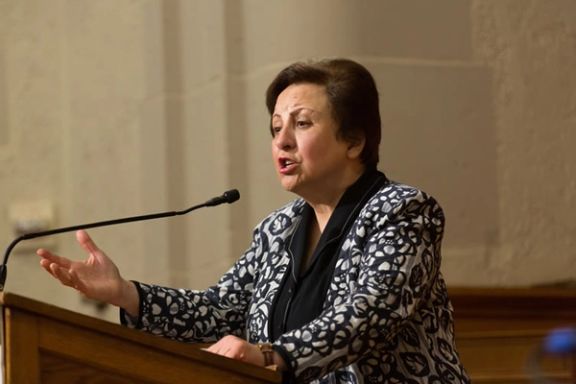
Nobel Peace Prize laureate Shirin Ebadi delivered a speech at the Nobel Peace Conference on Friday, drawing attention to the deteriorating human rights situation in Iran.
She also discussed the determination of the Iranian people to peacefully bring about change in the Islamic Republic reigme.
In her address, Ebadi highlighted the bravery of young Iranians, including teenage girls who risked their lives to protest on the streets. She emphasized that these actions signify a society awakened to the need for peaceful change and a desire to overthrow the current regime.
Ebadi also commemorated the tragic death of Mahsa Amini in detention, noting that citizens from hundreds of cities across Iran took to the streets to declare their rejection of the regime. She lamented that despite peaceful protests, the government responded with violence.
Addressing the international community, Ebadi urged hope and persistence in the face of dire circumstances, reminding everyone that many countries grapple with similar challenges. She expressed confidence that human rights defenders will contribute to improving these situations and called for continued efforts.
Ebadi brought attention to grim statistics, revealing that at least 80 of the victims in last year's nationwide protests were under 18 years old, emphasizing that this is only an estimate.
In closing, Shirin Ebadi promised the audience that this would be the last time she addresses the dire conditions in Iran, and her next discourse will focus on victories.
Shirin Ebadi, a vocal supporter of the Women, Life, Freedom protest movement, has been actively shedding light on the various facets of these protests and the violent response of the Iranian security forces.
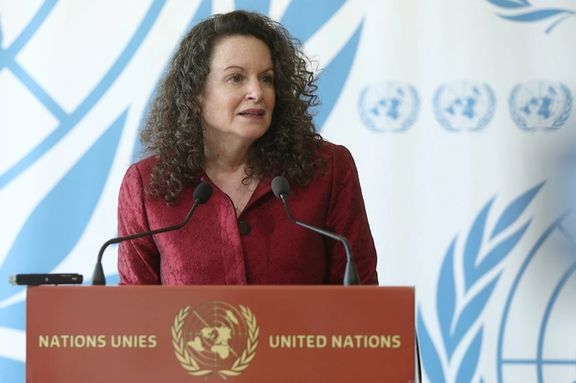
US ambassador to the UN's Human Rights Council condemns Iranian officials in UN leadership roles on the anniversary of Mahsa Amini's death.
Michèle Taylor's comments come as the Islamic Republic is set to chair the UN Human Rights Council Social Forum this November.
Taylor stated, "As we approach the one-year anniversary of Mahsa Amini's tragic death, let me be clear: The US reasserts that Iran, with its appalling human rights record, has no place in leadership roles within the UN human rights ecosystem. The time for accountability is now."
The controversy surrounding Iran's involvement in UN leadership positions has been a contentious issue. In June, the Islamic Republic secured a leadership role as one of the vice-presidents of the UN General Assembly, prompting reactions from several member states and numerous activists.
In May, Iran's UN ambassador, Ali Bahraini, was appointed to chair the UN Human Rights Council 2023 Social Forum, leading to widespread anger and indignation. The forum is scheduled to take place in Geneva on November 2nd and 3rd.
In response to these appointments, UN Watch, an independent human rights organization, launched a petition to UN Secretary-General Antonio Guterres, urging him to cancel the appointments. Additionally, UN Watch submitted a resolution to the UN aimed at overturning the decision, drawing further attention and scrutiny to Iran's involvement in UN leadership positions.

President Ebrahim Raisi’s administration has increased the budget allocated to the Iranian Ministry of Culture by more than 300%, causing widespread controversy.
Whilst economic challenges persist across the country, Raisi announced that the current budget of $24 million will be increased to a staggering $80 million.
Culture Minister Mohammad Mehdi Esmaili said, "When we took over the government, the budget was 12,000 billion rials, but currently, the ministry's budget has increased to 40,000 billion rials."
Esmaili explained that this dramatic increase was, in part, due to the allocation of one percent of the budget of banks and state companies to cultural endeavors, which, if realized, could dwarf the Ministry of Culture's budget by several multiples.
However, this substantial boost in cultural funding has been met with criticism, especially in light of Iran's ongoing economic woes.
A considerable portion of Iran's population continues to live below the poverty line, with analysts citing the government's inability to address the economic crisis effectively.
Iran has grappled with high inflation rates that have exceeded 40% for several years. This dire economic situation has severely impacted the purchasing power of salary earners, whose wages have experienced only marginal increases.
Consequently, the majority of Iranians are facing economic hardship, struggling to afford basic necessities like meat, fruits, and vegetables, with consumption levels plummeting by half.
Moreover, hundreds of millions of dollars are allocated annually to seminaries and various religious organizations to disseminate the clerical regime's propaganda, further fueling concerns about resource allocation amidst economic hardship.
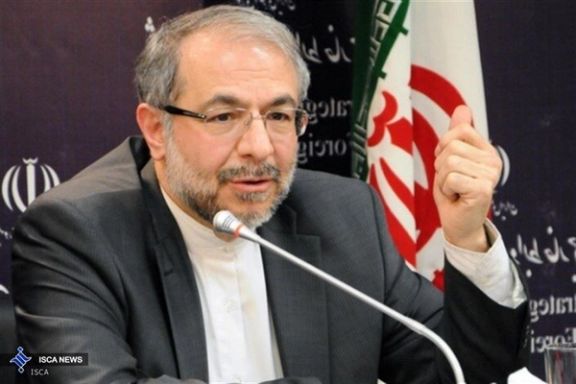
Iran’s assistant FM indirectly criticized the remarks made by the Taliban's Foreign Minister regarding the establishment of an inclusive government in Afghanistan.
Rasoul Mousavi emphasized the importance of "peace, stability, security, and sustainable development" in relation to the formation of a comprehensive government in Afghanistan as well as stating that "personalization" cannot exempt the Taliban from international responsibilities.
He cited United Nations Security Council resolutions 2513 and 2593, as well as consensus meetings among neighboring countries including Pakistan, China, Uzbekistan, and Iran
Mousavi spoke following criticism from Amir Khan Muttaqi, the Taliban's Foreign Minister, against countries advocating for an inclusive government in Afghanistan. Although no specific reference was made to Iran, it is widely assumed that his remarks were aimed at the Islamic Republic. "Our prisons do not have as many inmates as you execute,” he said.
In recent years, Iran has faced allegations of making opponents disappear and executing them. "In your country, thousands have disappeared, yet nobody dares to ask about it," Muttaqi.
Hossein Amir-Abdollahian, the Foreign Minister of the Islamic Republic, had previously stated that the Taliban is "part of the reality of Afghanistan, not all of it." He emphasized that Iran does not recognize the Taliban government until the formation of an all-inclusive government and expressed dissatisfaction with the Taliban's policies regarding women's education.






